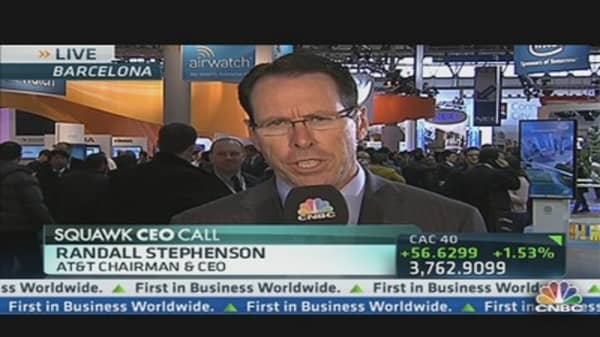The connected car will be as common as smartphones, AT&T Chairman and CEO Randall Stephenson told CNBC on Monday, following the company's deal to take over as the high-speed wireless provider for GM vehicles.
"General Motors has probably been the most aggressive thinking about the connected car and where the connected car goes," Stephenson said in a "Squawk Box" interview from Barcelona, Spain, at Mobile World Congress, the big conference looking at the untethered future.
GM's OnStar — best known for connecting drivers to live operators who provide directions or call emergency help after an accident — will start using AT&T instead of Verizon in its 2015 models, which go on sale next year.
(Read More: GM Switches to AT&T From Verizon for OnStar Wireless Service)
The automaker's wireless provider since 1996, Verizon will support OnStar services for all existing GM vehicles and any new models that come out before then.
OnStar has more than 6 million customers and charges $18.95 a month for its most basic service, or $28.90 a month for its premium package.
AT&T already has wireless deals with car makers including Ford and Nissan.
"The way we think about the car is that it's just a big smartphone on wheels in the future," Stephenson said. "The connected car will become just as routine as people carrying a smartphone."
(Read More: Samsung's New Phone Will Debut on Apple's Turf)
"The world of the smartphone, it changed our industry. We think the next five years, it's going to change every industry around the globe," he said, adding that the ubiquity of wireless broadband also enables connected homes and the mobile wallet to gain more traction.
(Slideshow: Hottest Trends in Mobile Devices)
Stephenson also predicted, "Three or four years from now, [television] will be watched as much on mobile devices as ... in people's offices and homes."
"We [also] think the backseat of the car will be another venue for people to watch entertainment."
And he stressed the backseat, saying, "We love you guys [on CNBC], but don't want people driving and watching you."




